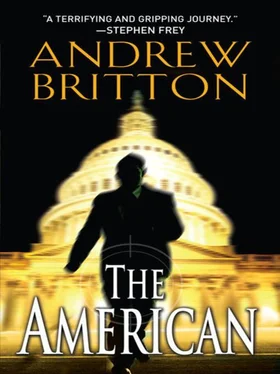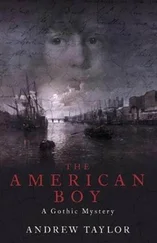Andrew Britton - The American
Здесь есть возможность читать онлайн «Andrew Britton - The American» весь текст электронной книги совершенно бесплатно (целиком полную версию без сокращений). В некоторых случаях можно слушать аудио, скачать через торрент в формате fb2 и присутствует краткое содержание. Жанр: Триллер, на английском языке. Описание произведения, (предисловие) а так же отзывы посетителей доступны на портале библиотеки ЛибКат.
- Название:The American
- Автор:
- Жанр:
- Год:неизвестен
- ISBN:нет данных
- Рейтинг книги:3 / 5. Голосов: 1
-
Избранное:Добавить в избранное
- Отзывы:
-
Ваша оценка:
- 60
- 1
- 2
- 3
- 4
- 5
The American: краткое содержание, описание и аннотация
Предлагаем к чтению аннотацию, описание, краткое содержание или предисловие (зависит от того, что написал сам автор книги «The American»). Если вы не нашли необходимую информацию о книге — напишите в комментариях, мы постараемся отыскать её.
The American — читать онлайн бесплатно полную книгу (весь текст) целиком
Ниже представлен текст книги, разбитый по страницам. Система сохранения места последней прочитанной страницы, позволяет с удобством читать онлайн бесплатно книгу «The American», без необходимости каждый раз заново искать на чём Вы остановились. Поставьте закладку, и сможете в любой момент перейти на страницу, на которой закончили чтение.
Интервал:
Закладка:
Although extremely intelligent, she was ruled by emotion, a fact that Ryan found both fascinating and a little overwhelming. There was nothing petty in Katie Donovan — for her, feeling decided what happened next; it was real, and could be trusted. Sometimes, the passion she exuded was almost frightening in its intensity. When she cared about something, she threw her whole heart into it. She had thrown her heart into him, he could see that now. For a woman who would jump on a plane and travel hundreds of miles to be by his side, Ryan thought he would give anything.
He walked back across long shadows in the street, to the woman he had saved and the woman who might yet save him.
CHAPTER 9
IRAN
The icy, intertwined limbs of the oak and conifer trees climbed high above the narrow side street running north from Niyavaran Park. The very highest points of the branches dangled heavily before yellow sodium lights that spilled down onto wet pavement shining in the cold drizzle. The light did not spread too far, as if it knew that the darkest corners of the city were best left to their own devices, alone and unrevealed.
Except for the hypnotic sound of the gentle rain, the streets of Tehran were silent as the night grew deep.
Ali Ahmedi, twenty-eight years old, six-year veteran of the Komiteh, the Iranian Secret Police, was hunched in the doorway of a dimly lit restaurant. The hood of his anorak was over his head, his breath steamed in the air. By his side, he held the Kalishnikov that could be bought for less than thirty American dollars in the markets at the city center. His weapon was better maintained than most, the bolt free of rust, with a light coat of oil. As soon as he was permitted, he would find a warm, comfortable place on the floor inside and clean the weapon again. Ahmedi took pride in his work, a deep pride that left little time for his wife and infant child. He was particularly pleased with his current assignment, despite the inclement weather. Across the street, a second guard was well concealed in a dark alley. The young officer counted himself fortunate; the alley had no overhead cover, and his friend would be well soaked by now.
Behind Ahmedi, past the grimy windows set in stout wooden frames, beyond the tables and chairs of rough-hewn oak, two men enjoyed a simple meal of lamb kebab and boiled rice.
A third guard drifted through the seating area in the foreground, an Uzi submachine gun slung carelessly across his chest. His eyes, though, were constantly moving over the dark shadows of the room, paying particular attention to the swinging door that led to the kitchen in the rear of the building. The two men and the guard; otherwise, the restaurant was empty.
Saif al-Adel pushed his plate away and leaned back in his chair, a contented expression settling over his narrow features. His face was almost feminine in appearance, with full lips, a long, straight nose, and pale, flawless skin pulled taut over high cheekbones. He took his time speaking, as was his custom; in the dangerous business that was his, one did not last by making rash comments or hasty decisions.
Hamza watched the man carefully. He was ever cautious of his fellow Egyptian’s volatile mood swings. They were difficult to catch; the signs could be as subtle as a small inclination of the head, a narrowing of the eyes. For Saif al-Adel, the word volatile held a different connotation than it did for the vast majority of humanity. Hamza had personally witnessed what the other man’s silent rage could lead to. Thinking about it now, he was brought back to an incident that had taken place nearly two years earlier…
The sands of the endless desert south of Kabul burned beneath the fiery orb above. Late in June of 2002, the morale within the organization was low, tempers flaring easily in the extreme temperatures that accompanied the rising and setting of the sun. The Afghans were afraid, and they tried to hide the fear with aggression and bluster. The fear could be attributed to the Americans, and to the MH-60 helicopters that would come low over the desert at night, and to the Special Forces soldiers that would fast-rope down to the desert floor below. Because of the fear, discipline was almost nonexistent in the flat expanse stretching in every direction. Young members of the organization congregated in large groups outside the caves, firing their weapons wildly into the air with complete disregard for the Western satellites that passed overhead. Hassan Hamza, while taking inventory of American Stinger missiles in the cool hollows of the stone outcropping, was drawn to the light outside by elevated voices.
Saif al-Adel, the recently installed commander of the military wing of Al-Qaeda, passed a small cluster of vociferous young volunteers. He heard the name of Muhammed Atef, his predecessor — until the day the Americans had come with their stolen coordinates and laser-guided bombs. He heard the sarcasm in the young voice, the snarled insults, and the derision that can be shown for the dead without fear of reprisal.
This is what Hamza saw: A junior member of the Taliban, maybe twenty years of age, held court at the center of a small group. His rifle was more than an arm’s length away, half-buried in the sand, forgotten by the soldier. The men surrounding him roared their approval at the vicious humor, laughed at his biting tongue, but al-Adel was ignored at the periphery of the group. His head was turning, the expression on his face did not change as he slipped the Makarov pistol free from his belt. Then the head of the young soldier was pulled back and to the right, the crowd scrambling away abruptly, startled shouts filling the air. The muzzle was jammed into the soft flesh beneath the jawbone, brown eyes wide in surprise as the trigger was squeezed, and the top of the boy’s head exploded up into the shimmering heat.
Saif al-Adel stood facing the stunned group of Taliban soldiers, the pistol loose in his right hand. There were armed men at his back, but he did not turn to track their movements. He was unafraid, and the statement had been made… The aggression faded from the eyes of the young men, replaced by a muted fear. Hamza had seen it all.
And could see it still. The hatred was gone at the moment, displaced by the rapture that always followed a successful operation. Hamza could feel it slinking just below the surface, though; for Saif al-Adel, pleasure and murder were born in the same bottomless pit.
“Hassan, my old friend, you are to be congratulated.” The words were soft and sincere. Despite himself, Hamza felt a strong swell of pride at the compliment. “The American is amazingly proficient.” A brief pause. “He is also obstinate, sullen, and evasive. I do not trust him at all.”
The older man could concede that these descriptions were accurate. He had arrived at the same conclusions long ago. He pulled at his ragged black beard while he framed a response.
“He is useful for what he can accomplish, and for what he can tell our soldiers. He is a gifted teacher; I have seen it with my own eyes. A man who is Western in appearance and mannerisms, but can speak numerous foreign languages with local dialects. A man who is able to instruct our fighters on the use of improvised explosive devices, who can demonstrate sniping techniques out to 500 meters without the benefit of a telescopic sight. Most importantly, a man who does not boast, does not condescend when given the opportunity… What would you call such a man?”
The commander drank hot tea and averted his eyes. The answer was clear, but he did not want to acknowledge the truth of it, because if it was true… If it was true, then he was no longer really in control.
“He is an American,” he spat. “He can only be against us.”
“That is not so, Saif.”
Читать дальшеИнтервал:
Закладка:
Похожие книги на «The American»
Представляем Вашему вниманию похожие книги на «The American» списком для выбора. Мы отобрали схожую по названию и смыслу литературу в надежде предоставить читателям больше вариантов отыскать новые, интересные, ещё непрочитанные произведения.
Обсуждение, отзывы о книге «The American» и просто собственные мнения читателей. Оставьте ваши комментарии, напишите, что Вы думаете о произведении, его смысле или главных героях. Укажите что конкретно понравилось, а что нет, и почему Вы так считаете.












